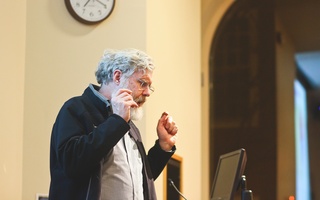{shortcode-771f6753f6419782a73de5e456031a22236ae897}Holding signs and singing songs, hundreds of Harvard affiliates—including University President Drew G. Faust—joined thousands of people flooding the streets of Cambridge and Boston Saturday to support scientific research in the face of potential cuts to federal research funding.
The demonstrations, which took place both on Harvard’s campus in Cambridge and in front of the Medical School in Longwood, occurred on the same day as the nationwide March for Science, a nonpartisan movement seeking to “champion robustly funded and publicly communicated science as a pillar of human freedom.”
University President Drew G. Faust gave opening remarks at the Cambridge rally, emphasizing the importance of science as a “foundation for our health, our prosperity, our possibilities.”
“We march today for a future in which the federal government supports the research and teaching essential to national and human progress,” Faust said. “We march because our future depends on the future of science.”
President Donald Trump’s proposals to significantly cut federal funding for scientific research has worried Harvard professors and administrators. In March, a University spokesperson harshly criticized the White House’s proposed budget—which could cut large portions of the Environmental Protection Agency and National Institute of Health’s budgets. Other Harvard affiliates have said they are concerned about Trump’s stance on climate change.
Harvard Medical School Dean George Q. Daley ’82 spoke at the Longwood rally, while renowned Medical School professor George M. Church gave remarks at the city-wide march in Boston Common.
Hundreds, many with homemade signs and young children in tow, joined Daley at the Longwood rally, where Medical School students, patients, researchers and Dean of Students Fidencio Saldana all delivered speeches.
In his speech, Daley criticized the White House’s recently-proposed cuts to scientific research, citing examples of how federally funded research has helped save lives lost to heart disease, cancer, and HIV.
“Make no mistake. Like a slow-growing but ultimately malignant cancer, the metastasizing doubt of science will lead to harmful decisions and reckless policies,” he said.
Daley extolled the impact of scientific research and said that nearly half of new cancer drugs approved by the Food and Drug Administration in the last five years came from research funded by National Institutes of Health.
“What is the next frontier?” said Daley, “If our nation stops investing in science, we will never know. We will never know what would have been possible.”
Amy Coughlin, the mother of an 11-year old daughter who was diagnosed with early-childhood neuroblastoma, described how new stem-cell treatments kept her daughter alive.
“That's research. It's messy and scary and completely necessary to save the people that we love,” said Coughlin. “Research is putting absolute trust and faith in doctors and scientists to cure your daughter.”
The Boston March for Science featured songs, speeches, and a children’s event. Church, recognized for his contributions to CRISPR gene editing, was among the first to speak.
“This is really great,” Church told the cheering crowd of several thousand. “This is really nerd city.”
Church urged to crowd to celebrate science funding and literacy regardless of affiliation.
“Today we show gratitude and concern for science funding and immigrant scientists from all around the world,” Church said. “Science is not optional, and we have big decisions to make and we need everyone engaged in this conversation, not just the elite.”
Welcome Bender, a medical school professor, held up a sign in the Longwood rally that read “Reality has a Truthiness All Its Own” on one side and “Reality is Not On TV” on the other. He said that he participated in the Longwood March simply “for science.”
“I think what’s really disturbing is that a large fraction of our country doesn’t think about evidence and science,” Bender said. “[This] always results in statements that cannot possibly be true.”
—Staff writer William L. Wang can be reached at william.wang@thecrimson.com. Follow him on Twitter @wlwang20.
Read more in University News
Between Harvard and Office for Civil Rights, A Symbiotic RelationshipRecommended Articles
-
FOUR HARVARD CRIPPLES IN SHATTERING STADIUM GAMEInjuries dealt the Harvard squad a series of sever blows on Saturday. Robb broke his leg and will be out
-
BADLY CRIPPLED 1927 TEAM PRACTICES AGAINA crippled Freshman football team reported to Coach Campbell at Soldiers Field yesterday afternoon for the first time since its
-
TEAM SHOWS MIXTURE OF GOOD AND BADTo many Saturday's game against Holy Cross gave promise of a Crimson team that would go down in history side
-
 Harvard Affiliates Slated to Speak at Boston March for Science
Harvard Affiliates Slated to Speak at Boston March for Science -
 Medical School Building Sale Nears Close
Medical School Building Sale Nears Close













